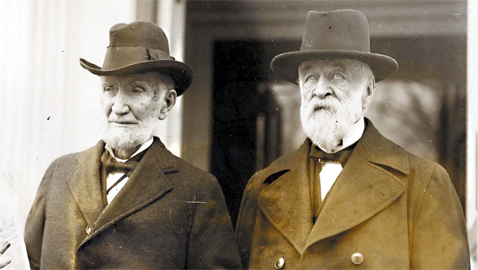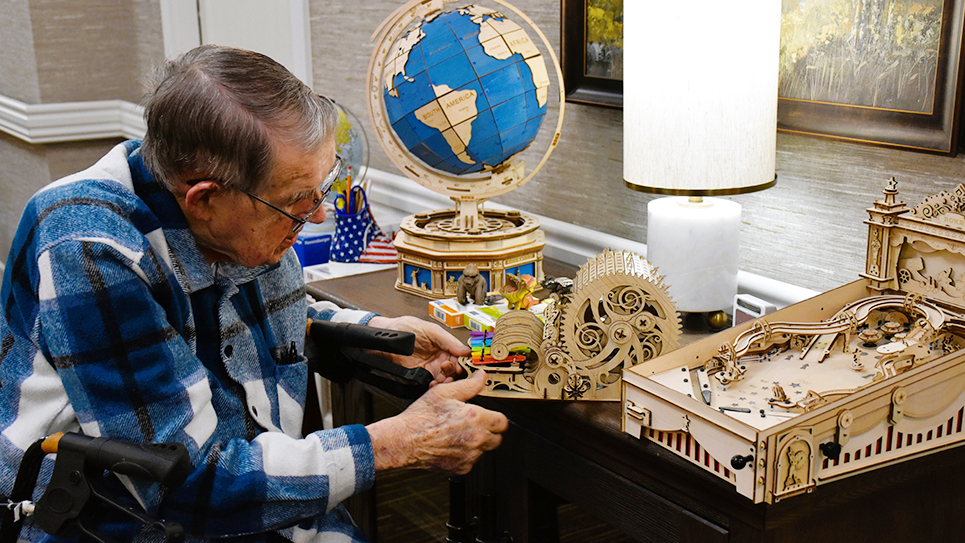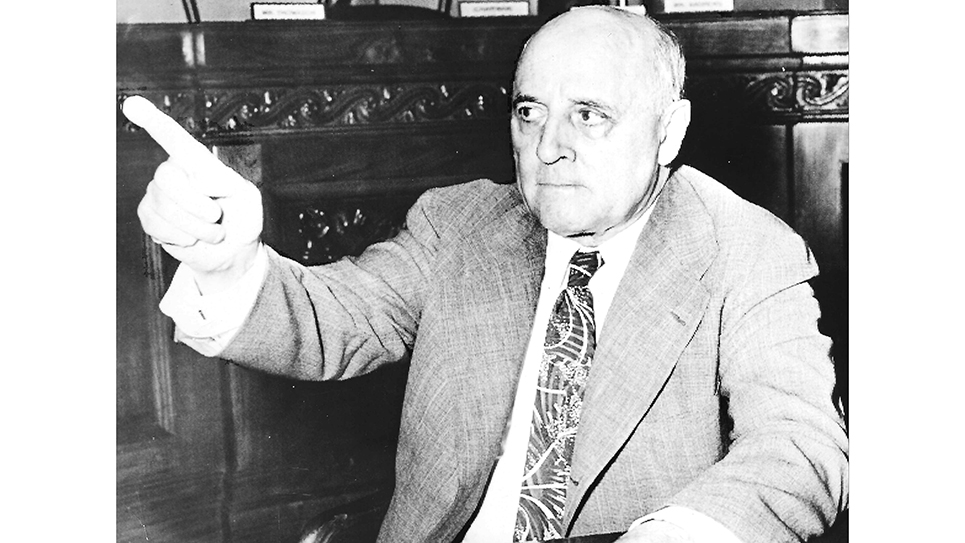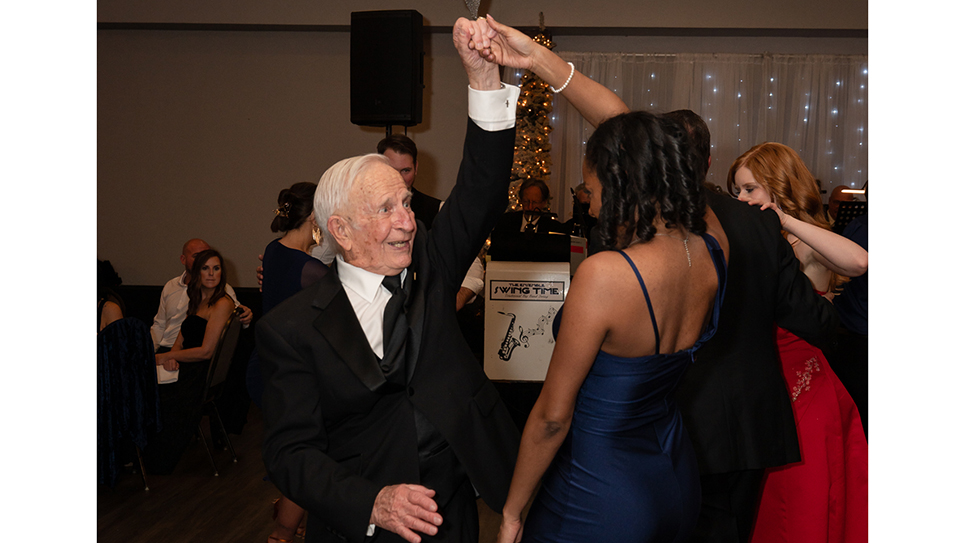
From the author’s personal collection.
‘Uncle’ Joe Cannon of Illinois (left and Congressman Stedman (right )of NC, the two oldest members of the House of Representatives, 1922.
One of the most colorful and powerful Speakers of the U. S. House of Representatives was Joseph Gurney Cannon of Illinois. Deeply conservative and thoroughly autocratic, “
Uncle Joe” Cannon ruled the House with an iron fist until a combination of progressive Republicans and Democrats revolted and stripped the Speaker of much of his power. For almost fifty years, Joseph G. Cannon sat in the U. S. House of Representatives. It was also Cannon who established the tradition of bean soup being served in the House restaurant daily.
Evidently Cannon arrived at the House restaurant one day for lunch and scanned the menu and was dismayed when he did not see the bean soup. Cannon growled, “Where’s the bean soup?”
When told the day was warm and the chef had not made any bean soup, Cannon erupted. “I had my mouth all set for bean soup!” Cannon issued an edict that regardless of the weather, hot or cold, he wanted bean soup on the menu and it has been every day since that time.
Joe Cannon was also the first congressman ever to break the record of serving more than forty years in the House of Representatives. Cannon’s own record of forty-six years of service was not broken until 1958. Speaker Cannon was also the first person ever to adorn the cover of TIME magazine.
Cannon was not a native of Illinois, having been born in the hamlet of Guilford, North Carolina on May 7, 1838. Two years later, the Cannon family moved to Indiana. Cannon’s father, Horace, lost his life when he drowned attempting to help someone in distress. Joe was only fifteen years old when his father died and was forced to assume the responsibilities of running the family farm. That work ethic seemed common to the Cannon children and they did well for themselves. Joe’s brother William grew up to have extensive real estate holdings and became a banker. Joe chose the law as a profession for himself.
Cannon’s interest in the law began when he had to testify as a witness in a case. The lawyer handling the case became something of a mentor to young Cannon. Joe Cannon only attended law school for a semester, but continued his studies and passed the bar exam. Cannon’s choice of Matoon, Illinois as a place to practice law and live was more accidental than the result of thought and study or even choice. The truth is Cannon had been traveling and ran out of money. He did well enough to become the state’s attorney, serving for just over seven years. Cannon had married in 1862 and two daughters were born and the family relocated to an impressive home in Danville, Illinois, where Uncle Joe would maintain his residence for the rest of his life.
Joe Cannon had been an avid supporter of Abraham Lincoln and it was during Lincoln’s administration that the future Speaker received his appointment as state’s attorney. In 1872, Cannon ran for Congress and won. Congressman Cannon remained in office for the next eighteen years, regularly winning reelection. Joe Cannon supported the orthodoxy of traditional Republican dogma; he was for high tariffs and opposing what he considered to be excessive regulation of business, big or small.
In 1890, the unthinkable happened. Cannon lost his reelection bid.
Cannon was determined to win back his seat in Congress and won a rematch in 1892.
Joe Cannon’s return to Congress revived his desire to become Speaker of the House. The bearded, frequently profane, cigar-smoking Cannon sought to become Speaker no less than four times before his Republican colleagues finally elected him to the post. Cannon finally succeeded in 1903. He would remain Speaker until the Republicans lost the 1910 Congressional elections.
Having moved up the ranks of the House and chairing some of the most powerful committees in that body, Joe Cannon understood the levers of power as well as anyone. When first elected Speaker, Cannon was also simultaneously Chairman of the Rules Committee, which effectively controlled which legislation reached the floor of the House. That meant Uncle Joe largely controlled the flow of legislation in the House of Representatives.
While he was a Republican, Speaker Cannon was disdainful of GOP President Theodore Roosevelt, whom he considered something of a radical. The Speaker once famously barked that TR “had no more use for the Constitution than a tom cat has for a marriage license”.
Roosevelt, a conservationist, encountered resistance from the Speaker, who snapped, he would not countenance spending “one cent on scenery”.
Holding both the Speakership and the chairmanship of the powerful Rules Committee, few bills ever reached the floor of the House without Uncle Joe’s express personal approval. Speaker Cannon also held the power to personally appoint the membership of every committee in the House of Representatives. A congressman only received a good or plum committee assignment with Cannon’s consent. Cannon rewarded those congressmen who shared his deeply conservative point of view, while withholding good assignments to those congressmen who enthusiastically supported the programs and administration of President Theodore Roosevelt. For a while, Cannon was able to maintain party discipline, but many members grew restive and resentful of Cannon’s enormous power.
Cannon’s attitude might well be summed up in one of his own pithy quotes: “ Sometimes in politics one must duel with skunks, but no one should be fool enough to allow the skunks to choose the weapons.”
There were a few attempts to reduce Uncle Joe’s power before a full-fledged rebellion occurred, led by Nebraska Congressman George W. Norris (for whom Norris Dam was named). Norris cobbled together a formidable coalition of progressive Republicans and Democrats who had long chafed under Cannon’s tyrannical rule. Forty-two Republicans allied themselves with the Democrats, who numbered one hundred and forty nine members. Among the Republicans joining Norris was Theodore Roosevelt’s son-in-law, and a future Speaker of the House, Nicholas Longworth of Ohio.
Norris timed the opening of his revolt wisely and well, as many of the Speaker’s strongest supporters just happened to be absent from the House floor. Alarmed when Norris began his assault on the powers of the Speaker began, Uncle Joe’s allies tried to round up those missing members, while tangling over parliamentary procedure inside the House Chamber. A filibuster broke out, which lasted an exhausting twenty-six hours. Finally, feeling more secure with most of his backers inside the Chamber, Speaker Cannon ruled Congressman Norris’ motion out of order. Norris immediately appealed the Speaker’s decision to the House, which voted to overrule Cannon’s own ruling and Norris moved that his resolution stripping the Speaker of much of his power be adopted, which it was.
Cannon then demanded the House vote to remove him as Speaker, a dare he frankly doubted very much the progressive Republicans would not take, as virtually no Republican in the House wished to see Uncle Joe replaced by a Democrat. Cannon’s request was duly voted down, but his time in the Speaker’s chair was limited in any event. The Democrats won the 1910 House elections and Cannon was replaced as Speaker by Champ Clark of Missouri.
Although Joe Cannon would continue to serve in Congress over another decade, with one brief interlude, he was never again to occupy the Speaker’s rostrum. The wide philosophical gulf between the conservatives and the progressives grew wider still when former president Theodore Roosevelt challenged incumbent William Howard Taft for the 1912 Republican nomination. Conservatives like Joe Cannon strongly supported Taft, while progressives naturally backed TR. Taft only barely managed to get himself renominated, but the general election was a disaster for the GOP. With the part deeply divided, Taft carried only two states, Vermont and Utah. Theodore Roosevelt, who was running as the Progressive Party’s candidate in the general election, actually outran Taft and carried California, Michigan, Minnesota, Washington, Pennsylvania, and South Dakota. The Democratic candidate, Woodrow Wilson, carried everything else.
The split in the Republican Party also affected Joe Cannon’s own electoral fortunes, as he faced both a Democratic and Progressive candidate and he narrowly lost his seat. For most men his age, that would have ended his political career, but Uncle Joe Cannon was nothing if not resilient. Cannon, at age seventy-six, came back to run for Congress again in 1914 and won.
Restored to his seat in Congress, yet no longer a factor in the House leadership or power structure, Congressman Cannon occupied himself by tending to the needs of his district and making the occasional arch observation. Remarkably well-liked by most of his colleagues in spite of his dictatorial past, Uncle Joe contented himself with his status as one of the elder statesmen of the House of Representatives.
Uncle Joe was the sort who made an impression wherever he went. In 1919, Cannon was a prominent guest at an event sponsored by his colleague from Illinois, Congressman William B. McKinley, for the State Girls’ Club. Congressman McKinley had hosted a reception and dance for the young women and Uncle Joe himself led a march, made some humorous remarks, and finally announced the last dance should be an old fashioned Virginia reel. The former Speaker said the “modern” dances were not nearly so pretty or graceful as the Virginia reel. Congressman McKinley laughingly described old Uncle Joe as the “Belle of the Ball.”
The old Congressman still enjoyed dancing and according to one Washington reporter, Uncle Joe “swings a wicked shoulder, and shakes a mean foot” well into his eighties. The former Speaker bragged he knew all or the most of the new modern dances and enjoyed dancing as much as he ever did.
Cannon won reelection in 1916, 1918 and 1920. He finally opted to retire in 1922, retiring on his own terms.
Uncle Joe had tried to help one of his friends and constituents, Len Small, get the Republican nomination for governor in 1920. Cannon’s interference in the GOP primary helped draw an opponent and the former Speaker finally told Small that he could not “stand for your platform, Len.” Cannon and his many friends decided to concentrate upon the Congressman’s own campaign. It was just as well, as Len Small would go on to the most corrupt governor in the history of a state that has had more than its share of corrupt chief executives.
Cannon had far more fun visiting Chicago for the convention of the fraternal order of Elks. Cannon was himself an Elk and arrived wearing a long black coat and holding his cigar. As he arrived in the lobby of the Congress Hotel, Cannon was greeted by some signing Elks and the former Speaker did not miss the opportunity to do a little politicking.
“Say you fellows,” Cannon told the signing Elks, pointing with his cigar, “I have made three or four presidents in my day. I am out to make another one now. His name is Harding, and he is an Elk from the word go. Watch him.”
Cannon was voted the “world’s greatest Elk politician” at the convention.
During his last campaign for office, Cannon commented upon the right of women to vote. 1920 was the first election in which women could vote for president all across the country. Cannon observed women had been allowed to vote in Illinois in 1916 and it was his opinion the fair sex had voted “as intelligently as their husbands, brothers or fathers.”
By the time he was ready to retire, Cannon had served longer in the House of Representatives than anyone in history. Cannon’s colleagues decided to give him a going-away party, although the former Speaker said it was more in the nature of a wake. Cannon’s comment seemed prophetic when another long-time Congressman, Henry Watterson, sent a wire to be read to the assemblage. Watterson told Uncle Joe, “We have been friends and colleagues for forty-four years. May we be colleagues in Heaven.”
Interviewed about his long service, Uncle Joe told a reporter it was a time for reflection; when the reporter asked what sort of reflection, the former Speaker replied gratitude for the forty-three years he had served in Congress. The reporter persisted and wanted to know just what sort of gratitude Cannon was reflecting upon.
Holding his ever-present cigar, Cannon growled, “For the ability to forget. There are a lot of things that are pleasant to forget.”
He went home to Danville and his sprawling house. When Joe Cannon came home to Danville, he celebrated his eighty-seventh birthday that May and received hundreds of telegrams and letters wishing him well. The congratulations were not confined to the mails, as folks in the hundreds came to speak to and shake hands with the former Congressman who sat on the front porch of his Vermillion Street home. A visiting photographer asked Cannon if he could go into the house and take some photographs and the former Speaker replied, “Sure, go ahead, but don’t make too much smoke. This stogie makes enough.”
Cannon’s guests for lunch included Governor Len Small, Senator James E. Watson of Indiana, and Secretary of Labor James J. Davis.
The day was filled with food, speeches, and parades. No less than five thousand Illinois school children paraded past the former Speaker’s home.
For one who had lived such a stormy and controversial life and despite his advanced age, death had to catch Uncle Joe Cannon napping.
Ninety when he died, the former Speaker’s own personal physician opined Cannon’s had been “the perfect death”. Dr. C. E. Wilkinson went on to say, “He had no diseases, whatever. Briefly, his physical machinery just wore out. He slept away peacefully.”
Uncle Joe Cannon still sleeps peacefully away in the soil of his beloved Danville.






